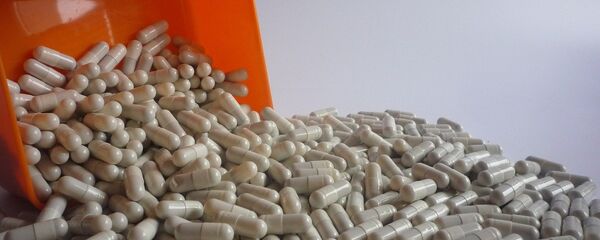Sputnik has discussed the development with Nikolay Tsatsyn, Head of the International Cooperation Department at the State Institute of Drugs and Good Practices under the Russian Ministry of Industry and Trade.
Sputnik: Can you tell us what is the significance of this agreement and what is this really going to mean?
Nikolay Tsatsyn: In fact, this is a very important document signed between our organisations because it will facilitate our efforts to make the life of people healthier and to achieve a better quality of life; because it's all about the health of people.
READ MORE: Nobel Prizes in Physiology or Medicine Awarded For Discovery of Cancer Therapy
Sputnik: What kinds of things are going to be happening under this agreement?
We started to discuss the memorandum in 2018 and have made it now. So technically it took less than one year to make the memorandum, which is quite a normal term. During these negotiations, meetings, talks, surprisingly there were no obstacles at all. Despite the political tensions, our British colleagues were very open, friendly and eager to cooperate. As a matter of fact, based on our experience, worldwide political tensions, if any, do not affect the relations with our counterparts. So we will be glad to cooperate with inspectorates worldwide.
READ MORE: Iran Investing Abroad to Get Medicines, Tech US Sanctions Hope to Block
Sputnik: You started this interaction two years ago and why do you think it has only been signed now? Actually it seems like the relations have gotten worse since, two years ago it would seem that Russian and the UK had better relationships…
Nikolay Tsatsyn: As I have already mentioned, this area is a very specific one. So we had to accumulate some background, I mean professional background, so that our British colleagues could see that we are reliable counterparts; and all that we do is for the benefit of the public. It's not about politics, it's about the health of people. I guess that's why it took some time to see that we can cooperate.
Sputnik: Did you encounter any obstacles in your work British colleges on the backdrop of Russia-UK political tensions?
Nikolay Tsatsyn: As I mentioned, actually there were no obstacles at all. It was really pleasant work to do, our British colleagues were very open and eager to cooperate.
Sputnik: Were there any political or I don't know government organizations…
Sputnik: How crucial is it for the UK to cooperate with Russia at a time when the nation is leaving the EU bloc?
Nikolay Tsatsyn: We know that exiting the European Union is quite a complicated and sensitive process. We know it from our colleagues that Great Britain is interested in keeping and enhancing relations with other nations despite Brexit. Therefore, I guess it's essential for Britain as well as for Russia to preserve and strengthen their relations despite all this turbulence. Besides, the memorandum is more about a particular professional sphere of cooperation and the primary goal is for the people's health and life; we all take medicines.
READ MORE: Ireland Expecting Security Issues and Medicine Shortages in No Deal Brexit
Sputnik: Is there any concrete examples of what this will enable if we talk about certain classes of medicines or some kind of specific exchanges, can you give us an idea of what specifically will now be able to take place as a result of this agreement?
Nikolay Tsatsyn: We plan to arrange for training seminars for British manufacturers of medicines so that they could better understand Russian regulatory requirements, Russian legislation in this area to avoid certain discrepancies that can be made during the manufacturing of medicines being sold here in Russia.
Sputnik: Are you saying that Russian standards are more stringent than UK standards?
Nikolay Tsatsyn: I guess in general they're the same but there are some little differences, which companies producing medicines shall be aware of. That is why such training seminars we believe are essential and very important.
Sputnik: Will there be similar training of Russian experts?
READ MORE: European Medicines Agency Loses Staff Amid Brexit-Induced Move to Amsterdam
Sputnik: What can you say about Russian-UK cooperation, is there a large market right now where Russian pharmaceuticals are shipped to the UK and vice versa?
Nikolay Tsatsyn: Yes, many medicines of UK origin are sold here in Russia. I cannot say the same about the Russian ones, but this memorandum will help lower regulatory barriers. So it will also help Russian manufacturers to come to the British market because we have products that can be sold there.
Sputnik: And just a final question. How much does the signature of the MoU raise hope for the improvement of Russian-UK ties in perhaps other domains, do you seen any hope there?
Nikolay Tsatsyn: As I mentioned, the memorandum is made in a very specific professional area and seemingly it doesn't affect the relations in other spheres. However, relations between the nations are built of varieties of specific ties. So we hope this memorandum will serve as a tie to improve the whole systems of relations between UK and Russia. And in addition, any such cooperative and friendly steps improve the image of both countries in the minds of their citizens and worldwide. Therefore, it will improve the relations between our countries, in general, I guess so.
The views and opinions expressed by the speaker do not necessarily reflect those of Sputnik.




